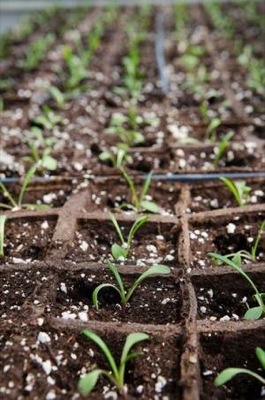
Native Delaware: Garden savings
Master Gardeners say no need to spend lots of green on growing green things
9:26 a.m., March 26, 2013--Quick, hide the credit cards; spring is here. Even the most budget-conscious gardener can get into trouble now. A trip to the nursery for a flat of plants results in three flats, plus a new spade and pair of garden gloves. A plan to grow tomatoes in containers morphs into a raised bed of pricey redwood. Even a stop at the market for bread and milk brings about a new basket of blooms.
University of Delaware’s Sussex Master Gardeners feel your pain. “We’re garden-a-holics; we have a tough time controlling ourselves in spring,” acknowledges Fran Meehan, a Milton-based Master Gardener.
Campus Stories
From graduates, faculty
Doctoral hooding
While they can’t help you with your self-control, the Master Gardeners do have some good advice on saving on gardening expenses.
For starters, get your soil tested, says Tracy Wootten, a horticulture agent with UD Cooperative Extension who oversees the Sussex Master Gardeners. You’ll spend a few bucks for the test but could save in the long run. For example, if you have acidic soil, cabbage and other vegetables won’t do well. You’ll need to fix the problem with limestone or other amendments before planting.
Many of the Sussex Master Gardeners save money by starting vegetables from seed. It’s also easy to start flowers from seed, notes Maggie Moor-Orth, a Delaware State University horticulture agent who provides technical assistance to the Master Gardeners.
If you’ve had bad luck starting plants from seed, try using a sterile, soil-less medium, says Moor-Orth. Seeds started in soil can suffer rot because of over-watering or non-sterile conditions.
Save money on your soil-less medium by buying dry mix rather than the wet mix formulation, advises Melora Davis, a New Castle County Master Gardener. “With the wet mix, you’re paying for water,” she notes.
Don’t buy those special (and expensive) plastic trays for starting seeds. Recycle plastic containers you already have; just be sure to punch drainage holes in the bottom. Davis suggests using single-serving coffee pods (such as the K-Cup brand).
Garden accessories are another area where you can economize. Stakes, twine, plant markers and weed fabric can get pricey so the Sussex Master Gardeners are creative recyclers. Cut pieces from an old mini-blind for plant markers, suggests Betty Layton of Greenwood. Pantyhose can be used instead of twine, and T-shirts work well, too. “One year, I grew three-pound watermelons on a trellis and used my husband’s old T-shirt as a sling,” recalls Wootten.
“Some gardeners like to use bamboo for stakes,” she adds. “It’s such an aggressive plant that if your neighbors have any, I’m sure they’d be happy to let you cut some for garden stakes.”
Carrie Murphy, horticulture agent for New Castle County Cooperative Extension, has even seen old golf clubs used to stake vegetable plants at Bellevue State Park’s community garden.
If you’re willing to consider more radical ways to save, get rid of your lawn. That’s what Master Gardener Brent Marsh did about 10 years ago. Ever since, he hasn’t spent a penny on lawn fertilizers, re-seeding bare spots, watering the lawn, lawnmower repair, or gas to run the mower. In place of turf grass, Marsh’s one-acre Georgetown yard is filled with perennials, shrubs and trees.
Even if you remove a portion of your lawn, you could save money.
“If you’re mowing a lot of lawn, you might think about turning part of it into a meadow planted with native grasses and wildflowers,” says Marsh. “You’ll see lots of birds and butterflies, enjoy the sounds of those songbirds and insects, and provide food for baby birds. And you won’t have as much grass to cut.”
Of course, Marsh didn’t go out and buy all those plants that now fill his yard. When a sapling turns up – its seed carried by wind or birds – he allows it to grow. He also propagates his plants by taking cuttings, seeds, and dividing them.
Murphy has been waiting patiently to divide some ornamental grasses that she purchased three years ago. She wanted to hold off until she had good-size divisions to add to a new landscape bed at her North Wilmington home. Those original three plants will become six plants – for the price of just three.
Once you've decided to divide your plants, it's important to divide at the appropriate time of year. Murphy divides her perennials in early spring or later in the fall, depending on when they bloom.
Backyard propagation
May 14, 7 p.m.: Minimize the costs of gardening by reproducing plants in your backyard. New Castle County Cooperative Extension office, Newark. $25. To request a registration form, call 302-831-COOP or download the form online.
Article by Margo McDonough
Photo by Danielle Quigley








